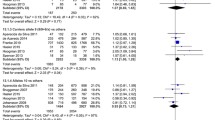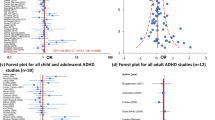Abstract
There have been conflicting reports on the association between the Val158/108Met polymorphism of the catechol-O-methyltransferase (COMT) gene and attention deficit hyperactivity disorder (ADHD). Therefore we would like to perform a meta-analysis of previous studies to assess the overall magnitude and significance of the association. Family-based and case–control studies of the association between the COMT gene polymorphism and ADHD were searched systematically and comprehensively. Odds ratios (OR) of association were pooled by the fixed effects model if no significant heterogeneity was present among different studies. Subgroup analysis by gender and ADHD subtypes were also performed. Eleven family-based and two case–control studies were identified. After pooling the results, no significant association between the COMT Val158/108Met polymorphism and ADHD was found (OR 0.99 (95% CI: 0.88–1.12), P = 0.87). There was also no significant association when the results were stratified by gender or ADHD subtype. There was no significant statistical heterogeneity (χ2 = 12.27, P = 0.2) although clinical heterogeneity was present in the studies, especially the ethnicity of subjects. Sensitivity analysis demonstrated absence of undue influence of any single study. Standard regression analysis showed no significant publication bias. We concluded that no significant association was present between the most common COMT gene polymorphism and ADHD. Further studies should employ larger sample size in more homogeneous subjects. Further investigations in moderator variables and gene–gene and gene–environment interactions are also warranted.
Similar content being viewed by others
References
American Psychiatric Association (1994) Diagnostic and statistical manual of mental disorders: DSM-IV, 4th edn. American Psychiatric Association, Washington DC
Barr CL, Wigg K, Malone M et al (1999) Linkage study of catechol-O-methyltransferase and attention-deficit hyperactivity disorder. Am J Med Genet 88:710–713
Bellgrove MA, Domschke K, Hawi Z et al (2005) The methionine allele of the COMT polymorphism impairs prefrontal cognition in children and adolescents with ADHD. Exp Brain Res 163:352–360
Benjamin J, Osher Y, Kotler M et al (2000) Association between tridimensional personality questionnaire (TPQ) traits and three functional polymorphisms: dopamine receptor D4 (DRD4), serotonin transporter promoter region (5-HTTLPR) and catechol-O-methyltransferase (COMT). Mol Psychiat 5:96–100
Bertocci B, Miggiano V, Da Prada M et al (1991) Human catechol-O-methyltransferase: cloning and expression of the membrane-associated form. Proc Natl Acad Sci USA 88:1416–1420
Biederman J, Faraone SV (2005) Attention-deficit hyperactivity disorder. Lancet 366:237–248
Egger M, Davey Smith G, Schneider M et al (1997) Bias in meta-analysis detected by a simple, graphical test. BMJ 315:629–634
Egger M, Smith GD (2001) Principles of and procedures for systematic reviews. In: Egger M, Smith GD, Altman DG (eds) Systematic reviews in health care: meta-analysis in context. BMJ Publishing Group, London, pp 23–42
Eisenberg J, Mei-Tal G, Steinberg A et al (1999). Haplotype relative risk study of catechol-O-methyltransferase (COMT) and attention deficit hyperactivity disorder (ADHD): association of the high-enzyme activity Val allele with ADHD impulsive-hyperactive phenotype. Am J Med Genet 88:497–502
Ernst M, Liebenauer LL, King AC et al (1994) Reduced brain metabolism in hyperactive girls. J Am Acad Child Adolesc Psychiatry 33:858–868
Faraone SV, Doyle AE, Mick E et al (2001) Meta-analysis of the association between the 7-repeat allele of the dopamine D(4) receptor gene and attention deficit hyperactivity disorder. Am J Psychiat 158:1052–1057
Faraone SV, Perlis RH, Doyle AE et al (2005) Molecular genetics of attention-deficit/hyperactivity disorder. Biol Psychiat 57:1313–1323
Faraone SV, Sergeant J, Gillberg C et al (2003) The worldwide prevalence of ADHD: is it an American condition? World Psychiat 2:104–113
Gogos JA, Morgan M, Luine V et al (1998) Catechol-O-methyltransferase-deficient mice exhibit sexually dimorphic changes in catecholamine levels and behavior. Proc Natl Acad Sci USA 95:9991–9996
Goldman-Rakic PS (1998) The cortical dopamine system: role in memory and cognition. Adv Pharmacol 42:707–711
Grossman MH, Emanuel BS, Budarf ML (1992) Chromosomal mapping of the human catechol-O-methyltransferase gene to 22q11.1–q11.2. Genomics 12:822–825
Hawi Z, Millar N, Daly G et al (2000) No association between catechol-O-methyltransferase (COMT) gene polymorphism and attention deficit hyperactivity disorder (ADHD) in an Irish sample. Am J Med Genet 96:282–284
Jiang SD, Wu XD, Zhang Y et al (2005) No association between attention-deficit hyperactivity disorder and catechol-O-methyltransferase gene in Chinese. Yi Chuan Xue Bao 32:784–788
Lachman HM, Morrow B, Shprintzen R et al (1996) Association of codon 108/158 catechol-O-methyltransferase gene polymorphism with the psychiatric manifestations of velo-cardio-facial syndrome. Am J Med Genet 67:468–472
Maher BS, Marazita ML, Ferrell RE et al (2002) Dopamine system genes and attention deficit hyperactivity disorder: a meta-analysis. Psychiat Genet 12:207–215
Manor I, Kotler M, Sever Y et al (2000) Failure to replicate an association between the catechol-O-methyltransferase polymorphism and attention deficit hyperactivity disorder in a second, independently recruited Israeli cohort. Am J Med Genet 96:858–860
McLeod HL, Syvanen AC, Githang’a J et al (1998) Ethnic differences in catechol-O-methyltransferase pharmacogenetics: frequency of the codon 108/158 low activity allele is lower in Kenyan than Caucasian or south-west Asian individuals. Pharmacogenetics 8:195–199
Ovtscharoff W, Eusterschulte B, Zienecker R et al (1992) Sex differences in densities of dopaminergic fibers and GABAergic neurons in the prenatal rat striatum. J Comp Neurol 323:299–304
Palmatier MA, Kang AM, Kidd KK (1999) Global variation in the frequencies of functionally different catechol-O-methyltransferase alleles. Biol Psychiat 46:557–567
Payton A, Holmes J, Barrett JH et al (2001) Examining for association between candidate gene polymorphisms in the dopamine pathway and attention-deficit hyperactivity disorder: a family-based study. Am J Med Genet 105:464–470
Purper-Ouakil D, Wohl M, Mouren MC et al (2005) Meta-analysis of family-based association studies between the dopamine transporter gene and attention deficit hyperactivity disorder. Psychiat Genet 15:53–59
Qian Q, Wang Y, Zhou R et al (2003) Family-based and case–control association studies of catechol-O-methyltransferase in attention deficit hyperactivity disorder suggest genetic sexual dimorphism. Am J Med Genet B Neuropsychiat Genet 118:103–109
Sergeant JA, Geurts H, Oosterlaan J (2002) How specific is a deficit of executive functioning for attention-deficit/hyperactivity disorder? Behav Brain Res 130:3–28
Taerk E, Grizenko N, Ben Amor L et al (2004) Catechol-O-methyltransferase (COMT) Val108/158 Met polymorphism does not modulate executive function in children with ADHD. BMC Med Genet 5:30
Tahir E, Curran S, Yazgan Y et al (2000) No association between low- and high-activity catecholamine-O-methyltransferase (COMT) and attention deficit hyperactivity disorder (ADHD) in a sample of Turkish children. Am J Med Genet 96:285–288
Tenhunen J, Salminen M, Lundstrom K et al (1994) Genomic organization of the human catechol-O-methyltransferase gene and its expression from two distinct promoters. Eur J Biochem 223:1049–1059
Turic D, Williams H, Langley K et al (2005) A family based study of catechol-O-methyltransferase (COMT) and attention deficit hyperactivity disorder (ADHD). Am J Med Genet B Neuropsychiat Genet 133:64–67
Vandenbergh DJ, Rodriguez LA, Miller IT et al (1997) High-activity catechol-O-methyltransferase allele is more prevalent in polysubstance abusers. Am J Med Genet 74:439–442
Zhang XN, Ruan LM, Le YP et al (2003) Association analysis between attention-deficit hyperactivity disorder and Val158Met polymorphism of catechol-O-methyltransferase gene. Zhonghua Yi Xue Yi Chuan Xue Za Zhi 20:322–324
Acknowledgments
We are grateful to Mr. Wilfred Wong for providing statistical advice in this meta-analysis.
Author information
Authors and Affiliations
Corresponding author
Rights and permissions
About this article
Cite this article
Cheuk, D.K.L., Wong, V. Meta-analysis of Association Between a Catechol-O-Methyltransferase Gene Polymorphism and Attention Deficit Hyperactivity Disorder. Behav Genet 36, 651–659 (2006). https://doi.org/10.1007/s10519-006-9076-5
Published:
Issue Date:
DOI: https://doi.org/10.1007/s10519-006-9076-5




